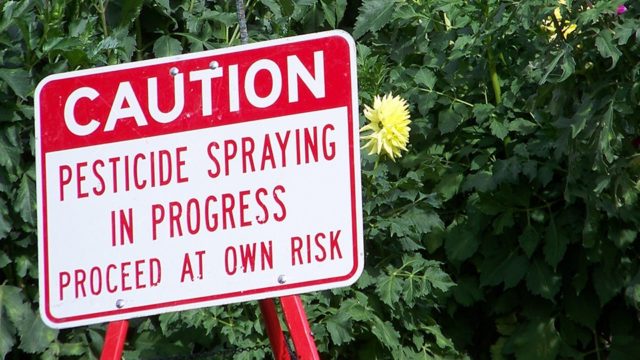Chlorpyrifos is a dangerous pesticide that is sprayed on crops such as wheat and potatoes and is used to kill mosquitos. Mounting scientific data shows the chemical poses serious risks to human health. It is notorious for its potential to cause brain damage in children. Chlorpyrifos exposure can happen through the air, skin, food, drinking water or at the workplace. Studies have shown that ninety-nine per cent of people in Canada have significant levels of this toxic chemical in their bodies.
In May 2021, Health Canada’s Pest Management Regulatory Agency (PMRA) announced that the registration of chlorpyrifos would be cancelled. However, the Agency allowed it to continue to be used and sold over three years (until December 2023). This decision fell behind pesticide regulations in the European Union where chlorpyrifos can no longer be sold and used. The decision to phase-out pesticides allows them to be used up instead of safely disposed of, which benefits chemical companies who save on disposal and recall costs and allows users to stockpile this dangerous product.
Health Canada’s delayed action to protect Canadians from chlorpyrifos underscores broader issues with how toxic pesticides are managed in Canada. Documents obtained by Ecojustice reveal that the PMRA repeatedly ignored warnings from its own scientists about the health risks posed by chlorpyrifos, with red flags being raised as far back as 2008.
The agency buried a drinking water model that showed that there were risks to children, and stalled review of the pesticide for close to 20 years while continually disregarding mounting concerns about potential contamination in drinking water dating back many years. These alarming health concerns were never shared publicly until they were released as part of the lawsuit.
Ecojustice, on behalf of Safe Food Matters and Prevent Cancer Now, launched a lawsuit challenging the extended phaseout. As a result of this lawsuit, Health Canada admitted it acted unreasonably and conceded that the phaseout decision should be set aside.
Rather than addressing the concerns raised by the lawsuit, the agency instead released a second phaseout decision in December 2021, which maintained the same extended phaseout until December 2023. At the same time, Health Canada announced that it would review the phase-out policy. Canada stands alone in finding that chlorpyrifos poses a “low risk” and the decision lacked supporting evidence. Ecojustice and its clients again challenged the PMRA’s phaseout decision in court.
CropLife, Canada’s biggest chemical company lobby intervened to defend delayed phase-outs of pesticides. Justice for Migrant Workers intervened to highlight the inability of Health Canada to determine that the product was safe for workers.
In November 2023, the court ultimately ruled the PMRA’s second decision was reasonable without addressing the extensive alarms raised by Health Canada’s own scientists, or the recent findings of the international Stockholm convention, which determined that chlorpyrifos is likely to lead to “significant adverse health and environmental effects such that global action is warranted.” Health Canada has not yet initiated the review of the phase-out policy.





